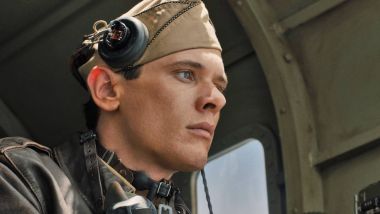Unbroken: The Bad, The Good and the Beautiful

The Bad
If this winter you have had enough of producers trying to eke out a thin storyline over multiple movie serialisations (think The Hobbit and MockingJay) here's a film directed by Angelina Jolie that does the exact opposite. The remarkable story of Louis Zamperini manages to pack three films into one (think a mash up of Chariots of Fire, Life of Pi and Schindler's List).
I loved the early years of Zamperini. Look out for a life-changing sermon, the redemptive love of an older brother and a nod to Jesse Owens at the 1936 Berlin Olympics. There's a breathtaking part of Zamperini's 5000m Olympic race that is hard not to cheer for. But it's hard not to compare it to Chariots of Fire and sadly Unbroken comes out second best.
The phrase 'unbelievable true story' is used in the publicity for the film. Nowhere is this more apt than in the retelling of Zamperini's 47 days at sea in a life raft in the shark-filled waters of the Pacific Ocean. This part of the film is told beautifully but, with Life of Pi so still so fresh in the mind, this section's visual thunder has been somewhat stolen.
The next part of Unbroken documents the very personal abuse Zamperini receives as a Japanese prisoner of war. It is hard to watch. The actor Miyavi, who plays the villainous Japanese internment camp commander known as "The Bird", said he did not want to portray him as a one dimensional character. Sadly for me this ambition was unsuccessful. His depiction was a caricature rather than a living creature. He could have learned from Ralph Fiennes' masterful portrayal of the twisted and perverse character of SS Amon Goeth in Schindler's List .
The Good
Across all three of these incredible stories Zamperini shines through as a truly exceptional person – the fact that it takes nearly three movies to tell his life story is a testament to his stature. Jack O'Connell, who makes a bold transition from TV ensemble cast member to leading man, spoke with great reverence for Zamperini in the pre-London premier interviews. For one person to have survived so many trials in his life right from a difficult childhood, an incredible maritime disaster story and the brutal inhumanity of the P.O.W. camp is incredible. But Zamperini didn't just survive, he emerged a better and stronger person.
I came away from the film challenged. Zamperini models a staggering resilience in the face of adversity. I find myself losing my temper in traffic jams and getting upset over a lost wallet. Zamperini faced discrimination, disaster, danger and death and yet showed an indomitable spirit. I was challenged by a man on the receiving end of so much torture, and yet who continually enriched the lives of those around him. In my own work with children often deemed broken, this film has re-inspired me to look beyond the trouble, even beyond the resilience, to see the incredible potential and impact one person can have on the world.
The Beautiful
Unbroken is soaked through with references to Christianity. The first glimpse of Zamperini as a boy shows him fidgeting in a church service about forgiveness. In the end credits we are told that motivated by his faith, he actively forgave his enemies before dedicating the rest of his life to work in peace and reconciliation. Big questions are raised about the goodness of God in the face of suffering and trust in God is demonstrated as the best and right way to live.
Angelina Jolie has given us a great gift this Christmas season, she has made a film that powerfully points the way to Jesus the Prince of Peace. After watching the horrendous brutality of a vicious camp commandant towards a young serviceman, we are shown the real life 80-year-old Zamperini running in Tokyo with a smile on his face, and told of his offer of forgiveness to those who had imprisoned him decades earlier.
In my opinion, Zamperini's real life story is even more powerful than the movie portrays. In an interview given at Faith Community Church on 9/11, Louis read out his incredible letter to the camp commandant "The Bird":
"Under your discipline my rights not only as a prisoner but also as a human being were stripped from me. It was a struggle to maintain enough dignity and hope to live until the war's end. The post war nightmares caused my life to crumble. But thanks to a confrontation with God through the evangelist Billy Graham I committed my life to Christ. Love replaced the hate I have for you. Christ said forgive your enemies and pray for them.... I now hope that you would also become a Christian."
Here is a family-friendly movie with some rich themes to unpack together – redemption, courage, righteousness and sacrifice. It is a film based around an inspirational person whose life is a powerful parable of the gospel of forgiveness. My prayer is that many would see the film and be challenged by a man who died just this year aged 97, and also be challenged by a God whose unbroken promise still stands – the offer of power to live with courage, grace and generosity now and the hope of eternal life to follow.
Damaris have produced resources to use with this film. Find them here.
Dr Krish Kandiah is the president of London School of Theology, the largest interdenominational, evangelical theological college in Europe. He is also the founder of Home for Good, a start-up charity helping to find adoptive and foster homes for children in the care system.











